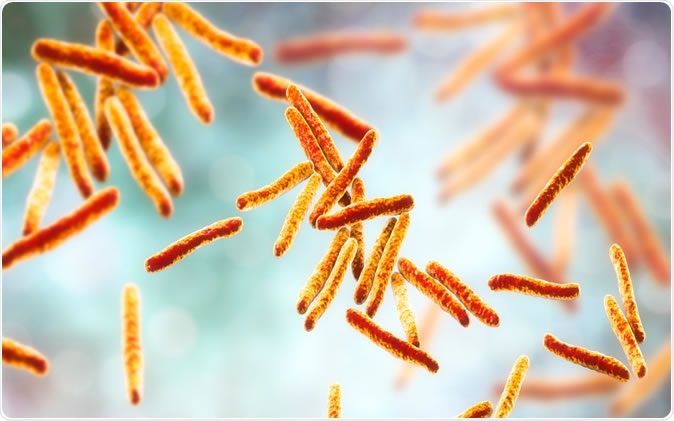
Bacteria Mycobacterium tuberculosis, the causative agent of tuberculosis, 3D illustration Credit: Kateryna Kon / Shutterstock
Bovine tuberculosis is a form of lung tuberculosis that occurs in cattle, and by law animals with the disease must be culled, or killed, after testing positive, to prevent its spread to other cattle or to humans. This is however not only an expensive solution but unacceptable in some countries and may not be effective in some situations.
Cattle suspected to have tuberculosis are tested using the skin test with tuberculin, also called PPD (purified protein derivative). This is a protein derived from the tubercle bacillus that produces a skin reaction if the person is infected. It is mandatory to test cows for tuberculosis using the tuberculin or PPD test in the UK. However, prior vaccination with BCG has been thought to interfere with the accuracy of this test, hindering the diagnosis of bovine tuberculosis. Other diagnostic tests that can distinguish infected and vaccinated animals detect immune responses to Mycobacterium bovis antigens that are not present in the BCG strain, but are expensive and relatively insensitive.
The BCG vaccine that is used to protect humans against tuberculosis, contains an attenuated or weakened strain of the tubercle bacillus, Mycobacterium bovis. It is used mostly in the developing world. The low prevalence of tuberculosis in developed countries, as well as the documented lack of consistent protection against lung tuberculosis in adults, and the possibility that it will cause a false-positive reaction to the PPD skin test for tuberculosis, making diagnosis difficult, have all militated against its use in the First World.
The BCG vaccine is effective in cattle, but when used, the PPD test becomes positive. This makes it difficult to tell if the animal is reacting because of its vaccination or because of the presence of tuberculosis in the body. As a result, even though the vaccine could protect cattle against the disease, its use in cattle in most countries is prohibited.
Creating a new BCG strain
The BCG strain lacks many genes present in the wildtype bacillus, as a result of accidental deletion. This led the researchers to see that at least three of the Mycobacterium bovis antigens were not essential for a protective immune response. In that case, they thought, they could build a new strain where more nonessential antigens could be intentionally deleted to differentiate between a skin reaction due to PPD and one due to Mycobacterium bovis infection.
The researchers looked at the existing BCG vaccine to isolate the immunogenic proteins that are common to it as well as to Mycobacterium bovis. They explored the genes containing instructions for these proteins, to see which of these were nonessential for bacterial persistence within the host, which is required for a strong immune response. In other words, they wanted the live vaccine to work to prevent tuberculous infection while not reacting with PPD.
In order to achieve this, they removed different genes singly from an array of BCG strains. Each new strain thus lacked one gene, but all had different missing genes. These strains were then inoculated into cows and the scientists looked at how well the bacteria survived. This let them find which genes could safely be removed without loss of vaccine efficacy.
Once they found out which these genes were, they removed them from the chromosome encoding BCG – creating a BCG-minus strain. The BCG vaccine so developed lacked proteins that induced a hypersensitivity reaction.
Using the proteins that had been deleted, the researchers then developed a new artificial form of PPD to use in a skin test. This test, unlike PPD, will show a positive result if the animal is infected but not if it has been vaccinated, because the vaccine lacks the synthetic PPD proteins.
Testing the new vaccine
Now it was time to check how well the new vaccine protected cattle against tuberculosis. When tested in guinea pigs, they found that the animals showed a positive skin test with the synthetic PPD if they were infected but not if they had been vaccinated with the BCG-minus strain, and surprisingly, not even if they had received the standard BCG strain. The latter result is attributed to the low power of the trial in view of the small immune response caused by the vaccine – which is nonetheless huge in economic terms, considering the value of a single bovine.
If verified, this finding could allow farmers to protect their animals with this vaccine, but they can still detect the disease using the new PPD.
In the words of researcher Johnjoe McFadden, “In order to control the spread of bovine TB, effective vaccination and accurate early diagnosis of the disease are critical. This new vaccine provides protection against bovine TB and will help in the fight against this deadly disease which infects over 50 million cattle worldwide and is economically devastating to farmers.”
The researchers now want to prove that both the vaccine containing the BCG-minus strain and the synthetic PPD are effective in cattle. This will pave the way for their use in vaccination as well as detecting the disease using the skin test.
Journal reference:
Chandran, A., Williams, K., Mendum, T. et al. Development of a diagnostic compatible BCG vaccine against Bovine tuberculosis. Sci Rep 9, 17791 (2019) doi:10.1038/s41598-019-54108-y, https://www.nature.com/articles/s41598-019-54108-y